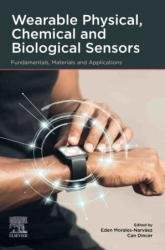Wearable Physical, Chemical and Biological Sensors: Fundamentals, Materials and Applications
- Добавил: literator
- Дата: 16-01-2023, 19:00
- Комментариев: 0
 Название: Wearable Physical, Chemical and Biological Sensors: Fundamentals, Materials and Applications
Название: Wearable Physical, Chemical and Biological Sensors: Fundamentals, Materials and ApplicationsАвтор: Eden Morales-Narvaez, Can Dincer
Издательство: Elsevier
Год: 2022
Страниц: 329
Язык: английский
Формат: pdf (true)
Размер: 18.2 MB
Wearable Physical, Chemical and Biological Sensors introduces readers of all backgrounds―chemistry, electronics, photonics, biology, microfluidics, materials, and more―to the fundamental principles needed to develop wearable sensors for a host of different applications. The capability to continuously monitor organ-related biomarkers, environmental exposure, movement disorders, and other health conditions using miniaturized devices that operate in real time provides numerous benefits, such as avoiding or delaying the onset of disease, saving resources allocated to public health, and making better decisions on medical diagnostics or treatment. Worn like glasses, masks, wristwatches, fitness bands, tattoo-like devices, or patches, wearables are being boosted by the Internet of Things in combination with smart mobile devices. Besides, wearables for smart agriculture are also covered. Written by experts in their respective fields, Wearable Physical, Chemical and Biological Sensors provides insights on how to design, fabricate, and operate these sensors.
This book offers insightful discussions on how to design, fabricate and operate wearable sensors in terms of materials, biorecognition elements, transduction methods, signal amplification strategies, and system design considerations, including the regulatory landscape. In addition, the current state-of-the-art on physical, chemical, biological sensing as well as hybrid approaches along with their advantageous functionalities and inherent challenges, and future perspectives are covered in depth. In particular:
Chapter 2 discusses the relevance of advanced materials in the development of wearable sensors, where the integration of outstanding optical and/or electrical properties into biocompatible, flexible, stretchable, lightweight substrates plays a critical role.
Chapter 3 highlights the relevance of biofunctionalization processes as well as biorecognition elements in wearables, which is crucial to achieve high specificity and selectivity in wearable biosensing. The main biorecognition elements employed in wearables are summarized and some prominent examples are described.
Chapter 4 overviews the signal detection techniques employed in wearable sensors. Offering outstanding examples, several optical and electrical interrogation techniques are critically illustrated and discussed.
Chapter 5 underscores the use of microfluidics for sampling in wearables, particularly the fabrication methods for microfluidic devices are discussed, along with various body fluids to be collected. Highlighting the capabilities of nanomaterials, signal amplification strategies for wearables are also covered.
Chapter 6 deals with healthcare data analytics for wearable sensors, emphasizing big data and artificial intelligence. Challenges ahead related to healthcare data analytics such as network scalability, power consumption, data accuracy, privacy and security, as well as regulatory landscape are also underscored.
Chapter 7 offers an overview on wearable physical sensors. Self-powered and non self-powered physical sensors are in-depth discussed. The rationale behind the integration of triboelectric nanogenerators or piezoelectric nanogenerators into self-powered wearables is elucidated along with insightful examples.
Besides, different approaches of non self-powered wearable physical sensors are elaborated, including capacitive, electret, field-effect transistor and resistive ones. Their current applications to monitor bodily activities such as movement, blood pressure, pulse, and respiration rate are also extensively discussed.
Chapter 8 provides an informative summary on wearable chemosensors. Herein, various chemical biomarkers, analytical parameters of wearable chemosensors as well as different sample types like saliva, interstitial fluid or tears, are critically discussed.
Chapter 9 highlights the state-of-the-art on wearable biosensors, particularly involving biofluids analysis with special emphasis in interstitial fluid and sweat, since they are amenable to continuous monitoring for wearable devices.
Chapter 10 underscores the characteristics of wearable hybrid sensors, which according to their function can be multimodal (integrating different transduction techniques) or multiplexed (integrating different measurands/analytes) in order to monitor different human health-related signals (such as biochemical and physiological, etc.).
Chapter 11 overviews wearable devices for plant protection, particularly for plant monitoring and detection of agrochemicals. This cutting-edge concept represents a powerful approach aiding at enhancing environmental protection and facilitating a sustainable development of agriculture.
Chapter 12 discusses the impact of new digital technologies, such as the Internet of Things, Big Data analytics, Machine Learning, deep learning, Artificial Intelligence, and smart devices, on the wearable sensing technologies. This chapter also highlights the relevance of wearable sensors in the development of future smart cities.
Скачать Wearable Physical, Chemical and Biological Sensors: Fundamentals, Materials and Applications
Внимание
Уважаемый посетитель, Вы зашли на сайт как незарегистрированный пользователь.
Мы рекомендуем Вам зарегистрироваться либо войти на сайт под своим именем.
Уважаемый посетитель, Вы зашли на сайт как незарегистрированный пользователь.
Мы рекомендуем Вам зарегистрироваться либо войти на сайт под своим именем.
Информация
Посетители, находящиеся в группе Гости, не могут оставлять комментарии к данной публикации.
Посетители, находящиеся в группе Гости, не могут оставлять комментарии к данной публикации.
